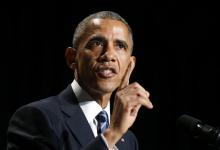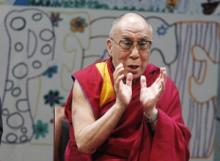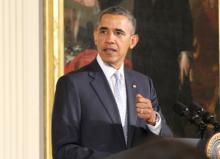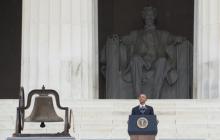President Barack Obama

President Obama on Feb. 5 called for an emphasis on what is just about the world’s religions as a way to counter the ways faith has been distorted across the globe.
“We see faith driving us to do right,” he said to more than 3,500 people attending the annual National Prayer Breakfast. “But we also see faith being twisted and distorted, used as a wedge — or worse, sometimes used as a weapon.”
He urged believers of all faiths to practice humility, support church-state separation and adhere to the Golden Rule as ways to keep religion in its proper context.
“As people of faith, we are summoned to push back against those who try to distort our religion — any religion — for their own nihilistic ends,” Obama said.
“Here at home and around the world we will constantly reaffirm that fundamental freedom: freedom of religion, the right to practice our faith how we choose, to change our faith if we choose, to practice no faith at all if we choose, and to do so free of persecution and fear and discrimination.”

China warned the United States on Feb. 2 that it was opposed to any country meeting the Dalai Lama “in any manner” after the White House said U.S. President Barack Obama would attend an event with the exiled Tibetan spiritual leader whom Beijing brands a separatist.
The White House said last week that Obama would deliver remarks at a Feb. 5 prayer breakfast in Washington about the importance of religious freedom. The Dalai Lama is due to attend.
“China is opposed to any nation or government using the Tibet issue to interfere in China’s domestic affairs, and opposed to any country’s leader meeting with the Dalai Lama in any manner,” Chinese Foreign Ministry spokesman Hong Lei said at a daily news briefing.
“China hopes the U.S. side abides by its promises on the Tibet issue, and proceeds to appropriately handle the issue on the basis of the overall condition of bilateral relations.”

U.S. President Barack Obama weighed in on one of India’s most sensitive topics as he wound up a visit on Jan 27, making a plea for freedom of religion to be upheld in a country with a history of strife between Hindus and minorities.
Hours before boarding a flight to Saudi Arabia, Obama warned India not to stray from its constitutional commitment to allow people to freely “profess, practice, and propagate” religion.
“India will succeed so long as it is not splintered along the lines of religious faith, as long as it is not splintered along any lines, and it is unified as one nation,” he said in a townhall address to mostly young Indians.
Obama’s speech, after three days in New Delhi aimed at cementing a strategic partnership, was widely interpreted as a message to Prime Minister Narendra Modi and his Hindu nationalist Bharatiya Janata Party (BJP), whose rise to power emboldened activists to declare India a nation of Hindus.

Tonight, faith leaders and all those who have spent years trying to fix our broken immigration system should feel gratitude toward President Obama. In a primetime address to the nation, the president announced he was taking executive action to relieve some of the suffering caused by the failures of the status quo. Millions of families will no longer live under the daily threat of having their lives torn apart by senseless deportations, which is something all Christians – whether Republican or Democrat – should celebrate. Many of our brothers and sisters in Christ, who have spent significant portions of their lives hiding in the shadows, can now enjoy the flourishing God intends for us all. Their joy and well-being must inform our judgments of the president’s action, especially in light of the biblical call to “welcome the stranger.”
Unfortunately, the president’s compassionate actions are creating a political firestorm among some Republicans in Washington. Their anger and antipathy toward the White House are blinding them to the positive effects these measures will have for our society. Even after decades living and working in our nation’s capital, I’m still amazed at the many ways political ideology can prevent us from having “eyes that see” and “ears that hear.” I lament that our political discourse has come to this.
Everyone agrees the only way to find sustainable, long-term solutions is through Congress passing bipartisan legislation. The Senate did exactly that more than 500 days ago, but their honest efforts have languished in the House of Representatives because of Republican intransigence. GOP leaders promised alternative policy ideas; reform garnered widespread, nationwide support — including among a majority of Republicans; faith leaders were hopeful after countless positive conversations with members of Congress; the president even told me that he was “optimistic” about reform after conversations with Speaker John Boehner; the country, and, more importantly immigrant families, patiently waited — yet, the House failed to act.

More Americans today say religion’s influence is losing ground just when they want it to play a stronger role in public life and politics.
A new Pew Research Center survey finds 72 percent of Americans say religion’s influence is declining in society — the highest percentage since Pew began measuring the trend in 2001, when only 52 percent held that view.
“Most people (overwhelmingly Christians) view this as a bad thing,” said Greg Smith, associate director of Pew’s Religion & Public Life Project. “That unhappiness may be behind their desire for more religion and politics.”
Growing numbers want their politicians to pray in public and for their clergy to endorse candidates from the pulpit. And nearly half of Americans say business owners with religious objections to gay marriage should to be able to refuse wedding-related services to same-sex couples.
There are three ways to look at the findings, released Sept. 22:

President Obama on Monday said he plans to tap Rabbi David Saperstein as the next ambassador-at-large for international religious freedom, the first non-Christian to hold the job, which was created in 1998.
As ambassador, the man named as the most influential rabbi in America by Newsweek magazine in 2009, will head the State Department’s Office of International Religious Freedom, and will be tasked with monitoring religious freedom abuses around the world.
“When it comes to the work of protecting religious freedom, it is safe to say that David Saperstein represents the gold standard,” said Secretary of State John Kerry, announcing the nomination at the State Department.
A Reform rabbi and lawyer, Saperstein, 66, has led the Religious Action Center of Reform Judaism for 40 years, and has spent his career in Washington, focusing on social justice and religious freedom issues. He was instrumental in the 1993 passage of the Religious Freedom Restoration Act, which requires the government to show a compelling reason for any action that impinges upon the exercise of religion.

One of the toughest political calculations in Washington is balancing competing claims of gay rights with the traditional prerogatives of religious freedom. After a number of setbacks on that front, President Obama may have finally found a small patch of middle ground with Monday’s move to bar federal contractors from discriminating on the basis of sexual orientation.
Yet Monday’s action also leaves in place a 2002 order signed by President George W. Bush that gives religious groups with federal contracts some leeway by allowing them to use religious beliefs as a criterion in making hiring and firing decisions; as a candidate in 2008 Obama pledged to overturn that exemption.
At the same time, Obama did not expand the exemption to explicitly allow religious groups that receive federal funds to use sexual orientation as grounds for hiring and firing, as some demanded.

Most Christians don’t approve of President Obama right now, but he gets high ratings from Muslims and other minority religious groups.
It’s not because of their religion, though.
Obama’s level of popular approval matches Americans’ political party ties, not their religious identity, age or almost any other demographic characteristic, said Jeffrey Jones, managing editor of the Gallup poll.
The newest Gallup tracking poll shows the president’s approval rating in June averaged 43 percent for Americans overall. However, his ratings sank with Catholics to 44 percent, down from 54 percent in June 2013.

What a difference 10 years makes.
Fast-forward to 2014, and the cultural and legal landscape could hardly be more different. Today, 19 states and the District of Columbia allow same-sex marriage, and federal courts have struck down bans in 11 more states. The U.S. Supreme Court ordered the federal government to recognize same-sex marriages after ditching a central portion of the 1996 Defense of Marriage Act last year, and 44 percent of Americans now live in states that allow same-sex marriage.
After four same-sex couples filed suit Wednesday challenging Montana’s ban on same-sex marriage, neighboring North Dakota is the only state that isn’t facing a challenge to its gay marriage ban — at least not yet.
So what changed?

President Obama on Monday called for people of all faiths to deter gun violence and anti-Semitism, one day after a gunman killed three people at Jewish centers in suburban Kansas City.
“That this occurred now — as Jews were preparing to celebrate Passover, as Christians were observing Palm Sunday — makes this tragedy all the more painful,” the president said at his annual Easter Prayer Breakfast.

Thirty years ago, when the United States established full diplomatic relations with the Holy See, critics of the move fell into two camps.
One group worried that the Vatican would try to unduly influence the U.S., where anti-Catholicism lies barely beneath the skin. Indeed, Harvard historian Arthur Schlesinger Sr. once called anti-Catholicism “the deepest bias of the American people.” Poet Peter Viereck of Mount Holyoke College called anti-Catholicism “the anti-Semitism of the intellectuals.”
Those in the other camp worried that the U.S. would try to unduly influence the Vatican. They complained, for example, that the U.S. would lobby the Vatican’s Pontifical Academy of Sciences to make it refrain from criticizing the now barely remembered Star Wars program, which the U.S. was promoting in the 1980s as part of our national defense system.

When President Obama and Pope Francis sit down at the Vatican on Thursday, the meeting may well offer a vision of what could have been for Democrats and the Catholic Church over the last six years: a leader of the state and a leader of the church working on the many issues where they agree while working through the issues where they don’t.
Of course, that’s not exactly how it’s gone for Obama and the U.S. hierarchy, even though Obama and the church both stress economic justice and the priority of the common good, universal health care, robust government support for the needy and comprehensive immigration reform.
The potential for a robust alliance fizzled almost from the start of Obama’s candidacy in 2007, and a relationship that began badly went downhill when he was elected.

President Obama is to meet Pope Francis for the first time next week as Obama wraps up a European tour, a high-profile encounter between two major world leaders that appears to carry especially high stakes from the U.S. perspective.
The White House and the American bishops have been at loggerheads for years on a range of culture war issues, and on Tuesday, just two days before the Vatican meeting, the U.S. Supreme Court will hear oral arguments on the contraception mandate that has sparked fierce opposition from the U.S. hierarchy.
But American and Vatican officials say the talks may disappoint those hoping for fireworks, and that the summit is going to focus on collaboration much more than conflict.

Many of us believe skyrocketing income inequality is the most important economic, political, and moral issue confronting our nation. Everyone from members of Congress to Pope Francis has called for action — and now our president is leading by example.
In his State of the Union address, the president announced he would sign an executive order to raise the minimum wage to $10.10 an hour for a group of federally contracted workers. Recent research has revealed that the federal government is our nation’s leading low-wage job creator, creating more than 2 million jobs through federal contracts, loans, and grants. With this stroke of the pen, the president will begin to transform the lives of many of these Americans who are struggling to survive.
Unfortunately, many conservative commentators are criticizing the president’s action. They claim he is overstepping his legal authority and even violating his constitutional powers.

Facing criticism that he does not give religious freedom enough attention, President Obama devoted most of his National Prayer Breakfast address to the issue, naming people imprisoned for their beliefs and calling out specific nations.
“We believe that each of us is ‘wonderfully made’ in the image of God,” Obama said. “We therefore believe in the inherent dignity of every human being — dignity that no earthly power can take away. And central to that dignity is freedom of religion.”
Promoting religious freedom is a key objective of U.S. foreign policy, Obama said. He said he is looking to fill the religious freedom ambassador position, one that Suzan Johnson Cook left last fall.

Barack Obama’s critics allege that the president doesn’t practice what he preaches on international religious freedom policy. Last week they pounced on an apparent gap between presidential rhetoric and reality.
On Thursday, the same day that Obama issued his annual Religious Freedom Day proclamation, Religion News Service published an article highlighting his administration’s failure to quickly nominate a new ambassador at large for religious freedom.
Suzan Johnson Cook resigned in October and a successor has yet to be named. It took the administration well over a year to nominate Johnson Cook in the first place, and then a skeptical Senate took an additional year to confirm her. During her brief tenure Johnson Cook never escaped criticism that she was unqualified for the job.
Even so, Obama used his proclamation to affirm, “America proudly stands with people of every nation who seek to think, believe, and practice their faiths as they choose.” He promised that his administration “will remain committed to promoting religious freedom.”

WASHINGTON — Fifty years to the day after Martin Luther King, Jr., knocked on the nation’s conscience with his dream, religious leaders gathered in a historic church to remind the nation that he was fueled by faith.
Later, in the shadow of the Lincoln Memorial where King thundered about America’s unmet promises, King’s children joined the likes of President Barack Obama and Oprah Winfrey to rekindle what Obama called a “coalition of conscience.”
At Shiloh Baptist Church, where King preached three years before his 1963 “I Have A Dream” speech, Christian, Jewish, Muslim, and Sikh clergy summoned King’s prophetic spirit to help reignite the religious fires of the civil rights movement.
King’s daughter, the Rev. Bernice A. King, said at the service that her father was a freedom fighter and a civil rights leader, but his essence was something else.
“He was a pastor,” said King, who was 5 when her father electrified the nation in front of the Lincoln Memorial. “He was a prophet. He was a faith leader.”

Editor's Note: The following is a transcript of President Barack Obama's speech from the Lincoln Memorial on the 50th Anniversary of the March on Washington.
We rightly and best remember Dr. King’s soaring oratory that day, how he gave mighty voice to the quiet hopes of millions; how he offered a salvation path for oppressed and oppressors alike. His words belong to the ages, possessing a power and prophecy unmatched in our time.
But we would do well to recall that day itself also belonged to those ordinary people whose names never appeared in the history books, never got on TV. Many had gone to segregated schools and sat at segregated lunch counters. They lived in towns where they couldn’t vote and cities where their votes didn’t matter. They were couples in love who couldn’t marry, soldiers who fought for freedom abroad that they found denied to them at home. They had seen loved ones beaten, and children fire-hosed, and they had every reason to lash out in anger, or resign themselves to a bitter fate.
President Barack Obama pushed back immigration reform on Tuesday indicating the bill will likely be passed in the fall. Expressing his opinion to Telemundo’s Denver affiliate, Obama supports the notion that all illegal immigrants be granted citizenship following an agreement upon GOP leaders. The Washington Post reports:
The president said that denying undocumented immigrants the chance to become citizens would leave them “permanently resigned to a lower status. That’s not who we are as Americans.”
Read more here.
In a report obtained by the Los Angeles Times, the Energy Department said Thursday that power plants are at risk of being shut down due to the effects of climate change. With the rise of temperatures and sea levels and decreased water resources, the Energy Department advises officials to become more environmentally aware of their natural disaster plans as their ideas could permanently affect the future of Earth's climate. The Los Angeles Times reports:
The report calls on federal, state and local governments to more urgently prepare crucial infrastructure - particularly coal, natural gas and nuclear plants - for the compounded risks posed by floods, storms, wildfires and droughts.
"All of our science goes in one direction: The damages are going to get worse,” Assistant Energy Secretary Jonathan Pershing said. “It will take dozens of actors from government and private sectors planning what to do and how to make it cost-effective.”
Read more here.